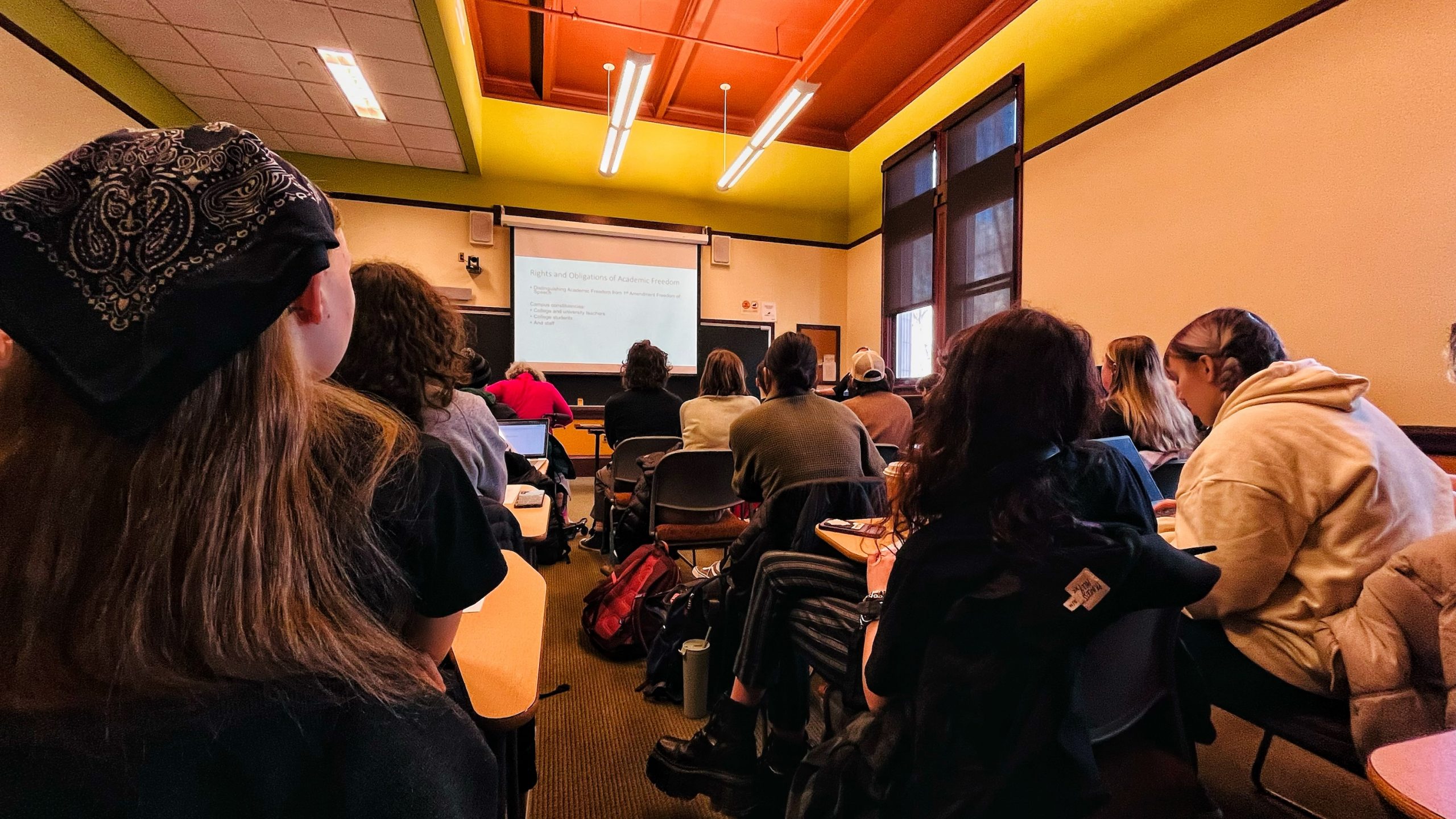
Tori DiPasquale
Contributing Writer
On Feb. 29, in Kauke 237, the first in a series of discussions sponsored by the College’s American Association of University Professors (AAUP) chapter took place. The discussion focused on academic freedom. It was a reaction to recent events in relation to a cease-fire protest in response to the Israel-Hamas war and emails being deleted by the administration.
Mareike Herrmann, professor and department chair of German and Russian studies, began advertising these discussions in her Feb. 22 email. This email included the AAUP’s response to President Anne McCall’s most recent communication explaining the deletion of the email advertising the event from inboxes. This discussion series began as a response to McCall’s perceived limitation of academic freedom; that issue, among many others, were discussed this past Thursday.
The discussion was well attended, with chairs from other classrooms brought in to accommodate the large crowd. Students, faculty and staff listed a variety of reasons for their attendance at the event. While some students were curious about the topic, others had heard about it from classmates. Herrmann and Désirée Weber, professor and department chair of political science, led the discussion and emphasized that the meeting intended to provoke conversation, not be a lecture. An emphasis was put on the necessity of having all groups on campus represented.
“I do think that there are other places and times on campus where some of us have had these conversations,” Weber said. “It’s also important to have those conversations involving and across those other constituencies.”
The discussion was divided into a presentation on defining “Academic Freedom” and other related terms, then small group discussion which was brought to the larger group. Brainstormed action steps were shared at the end.
Most of the definitions can be found on AAUP’s website; the discourse involved both discussing what terms meant on a definitional level, but also broader contexts surrounding these issues. The core of the discussion was related to protecting the rights of educators, and thus the rights of students. Conversation was focused on how to maintain those rights, and understanding what is included and excluded when it comes to freedom of speech in the classroom. Discussion questions brought up personal experiences at Wooster, involving violations of academic freedom and the consequences of losing that freedom. Students, staff and faculty were given the chance to speak freely about these topics in a more relaxed environment.
The discussion ended with the sharing of “Actions to Protect Academic Freedom” in hopes of giving the conversation a more tangible purpose and effect on campus. Attendees were told to contact state and federal legislators to urge them to pass legislation in line with academic freedom principles.
Ohio Senate Bill 83 was mentioned, due to concerns about its removal of mandatory DEI trainings and portrayal of colleges and universities as “sites of indoctrination.” Other calls to action included participating in student organizations, writing opinion-editorials showcasing individual viewpoints and organizing with peers to voice perspectives.
Herrmann is hopeful that these discussions will help people on campus “fight the feeling of powerlessness,” which she said has been a struggle at Wooster due to disagreements between administration and students, faculty and staff.
“People are either pulling back, opting out, or they’re keeping their feelings and their anxieties to themselves,” Herrmann said. “We don’t have enough avenues to share ideas, even if we differ on ideas.”
Herrmann hoped that the discussions will give the campus that very chance to voice their opinions and feel heard. Weber echoed this sentiment.
“I think providing us all with either a reminder or introduction to some of the tools to think through these ideas,” said Weber about the importance of the meetings.
Future discussions will be on different topics, including shared governance, which is the idea of thinking about the leaders on a campus and the role everyone plays in decision making. Financial decision making is another topic which Weber says has a particular importance on Wooster’s campus.
“There’s lots of conversation with the budget and budget alignment and certain kinds of projects being cut due to budget concerns,” voiced Weber. “We want to have a conversation about that.”
The final planned topic is campus activism and the function of protest and demonstrations that come from those positions.
The conversations will be ongoing; a discussion will be hosted at the same time every two weeks after Spring Break. Although affiliated with AAUP, Weber hopes the meetings will eventually be led by “different folks who have expertise or something to say or share.” This is not yet confirmed, but is a major goal that the Wooster chapter of the AAUP hopes to achieve.
